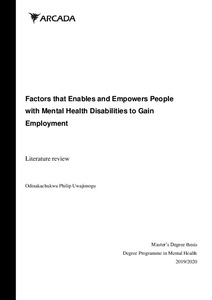Factors that Enables and Empowers People With Mental Health Disabilities to Gain Employment without Stigma
Uwajimogu, Odinakachukwu Philip (2021)
Uwajimogu, Odinakachukwu Philip
2021
All rights reserved. This publication is copyrighted. You may download, display and print it for Your own personal use. Commercial use is prohibited.
Julkaisun pysyvä osoite on
https://urn.fi/URN:NBN:fi:amk-202102122294
https://urn.fi/URN:NBN:fi:amk-202102122294
Tiivistelmä
Abstract:
Given the importance of empowerment and enablement to people with mental health disabilities and their relatives, building trust and portraying genuine care through multidimensional socio cultural processes helps for better engagement and inclusiveness for people with mental health disabilities (Proter et al, 2015). The aim of this study was to find out factors that enables and empowers people with mental health disabilities to gain employment without facing much stigmatization.
This study, also examines the experiences and challenges from the point of acceptance, social inclusiveness, mental health professionals’ attitudes, widespread social discrimination and isolation towards people with mental health disabilities by the service users and consumers (caregivers and patients and/or individuals). The study designed was chosen to review literatures that shows the factors that can enable and empower people with mental health disabilities. From the 116 research materials found at the first search, less than half of them were found to be related at the title level and only ten of them were relevant enough for analysis. And most of the studies found and not considered for analysis were from the mental health recovery movement and developmental psychology perspective or therapeutic recovery topics. The strength and uniqueness of this study was reviewing majority of the articles discussing social inclusiveness, empowerment, building trust and facilitating trust through locating other trust social networks. Although involving families and other support networks/persons has previously been mentioned as a potential contributor to successful empowerment and enablement, this fact, could not be denied or swept under the carpet (Procter et al, 2015). Results shows multidimensional socio-cultural approach is needed to empower and enable people with mental health disabilities get employed and sense of belonging.
Given the importance of empowerment and enablement to people with mental health disabilities and their relatives, building trust and portraying genuine care through multidimensional socio cultural processes helps for better engagement and inclusiveness for people with mental health disabilities (Proter et al, 2015). The aim of this study was to find out factors that enables and empowers people with mental health disabilities to gain employment without facing much stigmatization.
This study, also examines the experiences and challenges from the point of acceptance, social inclusiveness, mental health professionals’ attitudes, widespread social discrimination and isolation towards people with mental health disabilities by the service users and consumers (caregivers and patients and/or individuals). The study designed was chosen to review literatures that shows the factors that can enable and empower people with mental health disabilities. From the 116 research materials found at the first search, less than half of them were found to be related at the title level and only ten of them were relevant enough for analysis. And most of the studies found and not considered for analysis were from the mental health recovery movement and developmental psychology perspective or therapeutic recovery topics. The strength and uniqueness of this study was reviewing majority of the articles discussing social inclusiveness, empowerment, building trust and facilitating trust through locating other trust social networks. Although involving families and other support networks/persons has previously been mentioned as a potential contributor to successful empowerment and enablement, this fact, could not be denied or swept under the carpet (Procter et al, 2015). Results shows multidimensional socio-cultural approach is needed to empower and enable people with mental health disabilities get employed and sense of belonging.
Kokoelmat
Samankaltainen aineisto
Näytetään aineisto, joilla on samankaltaisia nimekkeitä, tekijöitä tai asiasanoja.
-
Perceived barriers to seeking mental health support among international nursing students
Makau, Consolata; Thiong´o, Beatrice (2024)Over the years, the world has become a global village. People are moving to foreign countries to study nursing. As they settle and integrate into the community, they are faced with numerous challenges, such as separation ... -
A study on mental health service systems in UK and Finland among youths aged 13-19 years
Wanjiru, Hellen; Abdiqadar, Farah (2017)Mental health services in the United Kingdom and Finland have faced a variety of problems over the years as noted in the research articles cited in this study. This study aims to identify the challenges faced by the system ... -
Mental Health Promotion in Elderly Care Home
Obasuyi, Donald (2022)Mental health and well-being of the elderly people is quite important just like any other time in life. However, recognizing mental illness and promoting mental health and well-being of the elderly people in care home needs ...Rajattu käyttöoikeus / Restricted access / Tillgången är begränsad


